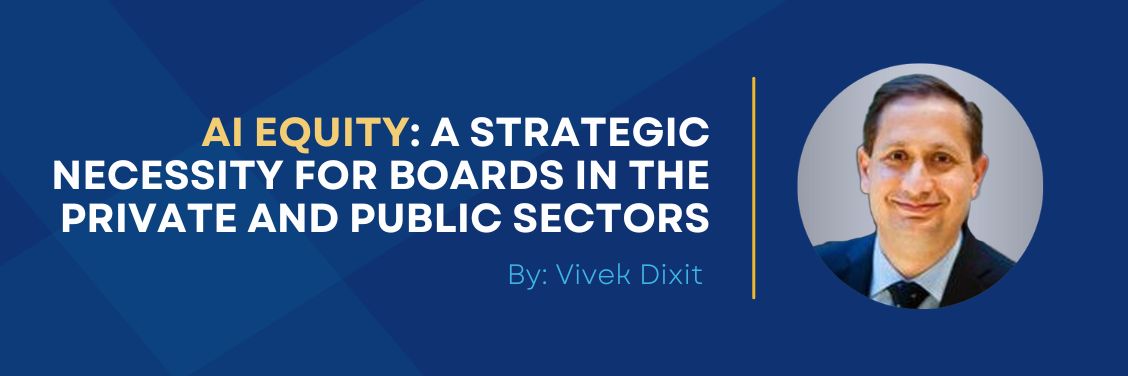AI Equity: A Strategic Necessity for Boards in the Private and Public Sectors

The ascent of Artificial Intelligence (AI) from a mere buzzword to a transformative powerhouse has been swift and all-encompassing, spanning various industries. Yet, this progress has brought to the fore a crucial concern – AI equity. Once a subject of philosophical debates, AI equity has evolved into a strategic imperative that resonates deeply within the domain of corporate governance. Beyond its ethical dimensions, AI equity now encompasses legal adherence, strategic significance, and the nurturing of stakeholder confidence. This piece delves into the multifaceted significance of AI equity for both private and public company boards, examining its strategic implications, legal obligations, and its role in fostering transparency and accountability.
Consider, for instance, the case of a Canadian financial institution with $66B AUM (Assets Under Management), $0.64B in revenue, over 1000 employees with 21% YoY employee growth and estimated revenue per employee around $353K. This institution grappled with the challenge of mitigating bias in its AI-driven mortgage lending process, a compelling example highlighting the practical importance of AI equity.
They faced accusations of biased lending practices attributed to its AI-based mortgage approval system. Disparities in loan approvals among diverse demographic groups led to reputational damage and potential legal liabilities. To address this, the bank embarked on a journey to counteract bias and enhance equity in its lending decisions.
Their approach to combating bias involved a series of strategic measures:
- They collected comprehensive and diverse data to construct a more inclusive training dataset. This step was pivotal in capturing a wholistic view of the applicant pool, thereby diminishing the risk of skewed outcomes.
- The bank employed metrics to quantify disparities in loan approval rates across different demographic segments. This data-driven approach provided clear insights into the existing bias within the AI system.
- They employed pre-processing techniques to rectify biases in the training data. These methods aimed to mitigate the influence of historical biases while preserving the predictive accuracy of the AI model.
- The bank fine-tuned the AI algorithm to factor in equity considerations during decision-making. This ensured that the model's outputs weren't unfairly skewed toward or against any particular group.
- They implemented a robust monitoring mechanism to consistently evaluate the AI model's fairness. Routine audits and metric tracking aided in identifying emerging biases and taking timely corrective actions.
Their commitment to AI equity yielded favorable outcomes:
- The AI-powered mortgage approval system demonstrated more balanced loan approval rates across demographic groups, effectively addressing the initial bias concerns.
- Their proactive stance towards addressing bias bolstered its reputation. The bank was perceived as owning up to past shortcomings and striving for a fairer lending environment.
- By tackling bias, they reduced the risk of legal actions and regulatory penalties tied to discriminatory lending practices. This showcased dedication to ethical practices and regulatory compliance.
Their journey underscores the significance of AI equity in data-centric decision-making industries. By amalgamating data enrichment, equity metrics, algorithmic adjustments, and ongoing monitoring, the bank effectively mitigated bias in its mortgage lending procedure. This case serves as a beacon, illuminating the transformative potential of AI equity and offering guidance to other entities in addressing bias, augmenting equity, and nurturing stakeholder trust. As AI continues to reshape various sectors, embracing equity emerges as a strategic necessity, ensuring technology's benefits are all-encompassing while retaining ethical standards.
AI equity transcends theoretical discussions and assumes a pivotal role in cultivating transparency and accountability from a corporate governance standpoint. A company's reputation is no longer solely contingent on ethical practices: the equity of its AI systems holds equal weight. Biased AI algorithms can cast a shadow on a company's reputation, eroding stakeholder trust and potentially causing financial setbacks. Thus, addressing AI equity becomes an assertion of responsible decision-making, bolstering stakeholder confidence and safeguarding the organization's integrity.
Further, AI equity has transcended ethical considerations and become a legal mandate that private and public company boards cannot afford to disregard. Anti-discrimination laws extend their reach into the corporate sphere, holding companies answerable for biased practices perpetuated by their AI systems. Non-compliance entails two-fold consequences: legal ramifications and reputational harm. Companies whose AI inadvertently leads to discriminatory outcomes might find themselves enmeshed in legal battles and facing severe backlash from stakeholders. Consequently, the pursuit of AI equity has evolved from a moral duty to a legal obligation, compelling boards to traverse the intricate legal landscape with utmost caution.
The efficacy of AI systems is closely intertwined with equity considerations. Biased algorithms undermine the reliability of AI applications, compromising their effectiveness and eroding the decision-making process of boards. As companies progressively integrate AI technologies into their operations, ensuring fair and unbiased outcomes becomes imperative. Neglecting AI equity could result in suboptimal results, the erosion of board credibility, and dissatisfaction among shareholders. Hence, boards must take proactive measures to align AI systems with overarching strategic objectives to achieve optimal results and uphold stakeholder trust.
Within the realm of corporate governance, AI equity mirrors solving a multi-dimensional puzzle. Bias and discrimination can infiltrate various facets, from executive recruitment to compensation analysis. Imagine AI-driven hiring tools excluding diverse candidates due to historical biases entrenched in algorithms. This complexity underscores the challenge of striking a balance between equity and discrimination concerns.
While eradicating all bias might seem an ambitious endeavor, private and public boards can proactively address these challenges. This involves robust data collection, the creation of diverse training datasets, continual bias testing, and regular evaluations of AI systems. Regulatory frameworks, transparency initiatives, and stakeholder engagement further contribute to the responsible integration of AI in corporate governance, ensuring equity remains central to the decision-making process.
AI equity and discrimination have outgrown their confines within ethical discourse; they now offer tangible strategic value for both private and public company boards. These concerns intersect with legal obligations, strategic considerations, and efforts to enhance efficacy. Tending to AI equity is no longer optional. It is a strategic and ethical imperative that fortifies transparency, compliance, and stakeholder trust in the ever-evolving landscape of corporate governance.
AI equity has risen as a strategic necessity, extending its impact beyond ethics to shape the very bedrock of corporate governance for private and public company boards. It encompasses transparency, legal adherence, and the preservation of stakeholder trust. As AI continues to reshape business environments, boards must navigate the intricate terrain of AI equity to ensure responsible and effective decision-making, fostering an atmosphere of transparency, accountability, and fairness. By prioritizing AI equity as a strategic focal point, companies can harness the full potential of AI while upholding their obligations to stakeholders and society at large.
References:
- Algorithmic bias detection and mitigation: Best practices and policies to reduce consumer harm. https://www.brookings.edu/articles/algorithmic-bias-detection-and-mitigation-best-practices-and-policies-to-reduce-consumer-harms/
- Three naive Bayes approaches for discrimination-free classification. https://link.springer.com/article/10.1007/s10618-010-0190-x
- Fairness and machine learning. In Big Data (pp. 1-12). https://mitpress.mit.edu/9780262048613/fairness-and-machine-learning/
Additional Information:
- For more insights on AI fairness in corporate governance, you can explore the resources provided by the Fairness, Accountability, and Transparency in Machine Learning (FAT/ML) community: https://www.fatml.org/
- To learn about practical techniques for achieving AI fairness, you can refer to the AI Fairness 360 toolkit by IBM: https://aif360.mybluemix.net/
- Stay updated on the latest developments in AI ethics and fairness through organizations like the Partnership on AI: https://www.partnershiponai.org/

ABOUT VIVEK DIXIT
Vivek is a seasoned professional with over 25 years of multifaceted experience in board governance, executive leadership, and venture capital. Adept at steering technology and operations, he boasts a successful track record managing cumulative P&L responsibilities exceeding $100 MM. His two-decade journey showcases exceptional leadership, driving growth in high-growth products, go-to-market strategies, and global business operations. In the financial services sector, Vivek held prestigious roles as CTO, CIO, and SVP of Products for over a decade. Beyond industry-specific roles, he brings over a decade of consulting expertise in both public and private sectors. Serving as an investor, advisor, mentor, and board member for more than 12 years, Vivek leverages his diverse background to provide invaluable insights, contributing significantly to the success of startups.
He is currently a board observer for a private company, advisor to a VC firm, board of advisor for Texas A&M university, Harvard Business Review and McKinsey & Co., and mentor-VC cohort for several startup accelerators.
He is author of two books on artificial intelligence published by Amazon, Monetizing AI: Navigating wealth and the AI economy and Infinite Intelligence: A comprehensive guide to Artificial Intelligence.
Loc & LinkedIn:
HOUSTON, TEXAS, USA
